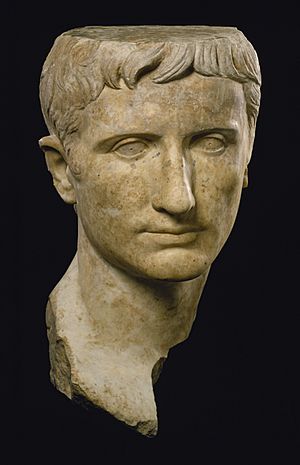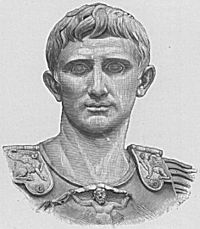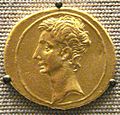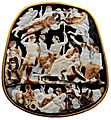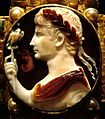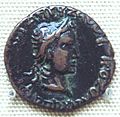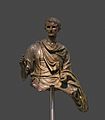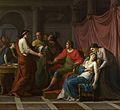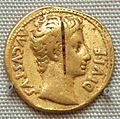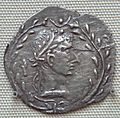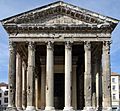Augustus facts for kids
Quick facts for kids Gaius Julius Caesar Augustus |
|||||
|---|---|---|---|---|---|
| Emperor of the Roman Empire | |||||
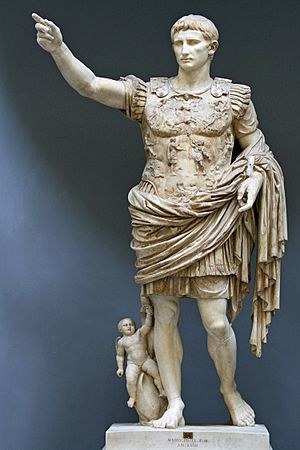 |
|||||
| Reign | 16 January 27 BC – 19 August 14 AD | ||||
| Successor | Tiberius | ||||
| Born | 23 September 63 BC (Roman calendar) Rome, Roman Republic |
||||
| Died | 19 August 14 AD (Julian calendar) (aged 75) Nola, Italy, Roman Empire |
||||
| Burial | Mausoleum of Augustus, Rome | ||||
| Spouse |
|
||||
| Issue | Julia the Elder; Gaius Caesar (adoptive); Lucius Caesar (adoptive); Tiberius (adoptive) |
||||
|
|||||
| Imperial Dynasty | Julio-Claudian | ||||
| Father | Natural: Gaius Octavius; Adoptive: Julius Caesar (in 44 BC) |
||||
| Mother | Atia Balba Caesonia | ||||
 |
|
| These articles cover Ancient Rome and the fall of the Republic | |
| Roman Republic, First Triumvirate, Assassination of Julius Caesar, Mark Antony, Cleopatra VII, Pompey, Cicero, Second Triumvirate |
Augustus (born Gaius Octavius, later known as Gaius Julius Caesar Augustus) was the first and one of the most important Roman Emperors. He lived from 63 BC to 14 AD. Augustus helped Rome change from a Republic (where people voted for leaders) into a powerful Roman Empire (ruled by an emperor).
Contents
Early Life of Augustus
Augustus was born in Rome. His birth name was Gaius Octavius Thurinus. His father, also named Gaius Octavius, came from a respected family. He was a governor in Macedonia before he passed away in 58 BC.
Augustus's mother, Atia, was the niece of Julius Caesar. Caesar was Rome's greatest general and its real ruler. In 46 BC, Caesar had no legal children. He took his grand-nephew, Octavius, to be a soldier in Hispania (modern-day Spain). Caesar later adopted Octavius in his will as his heir.
After being adopted, Octavius took the name C. Julius Caesar Octavianus. People often called him "Octavian." When Caesar was killed in March 44 BC, Octavian was only eighteen years old. He was with the army in Apollonia, which is now in Albania.
Augustus's Reign as Emperor
Augustus became emperor through cleverness and skill. He then ruled with great wisdom. He gave Rome 40 years of peace and growing wealth. This time is known as the Pax Romana, or "Roman Peace."
Changes to the Military
Augustus created Rome's first permanent army and navy. He placed the legions (large army units) along the Empire's borders. This stopped them from getting involved in politics. A special group called the Praetorian Guard stayed in Rome. Their job was to protect the Emperor.
Financial and Social Reforms
Augustus also improved Rome's money and tax systems. He did not start any major wars. He used the huge wealth from the Empire to pay the army well. This kept the soldiers happy. He also kept the Roman people happy by making the capital city beautiful. He put on amazing games for them to enjoy.
Augustus strongly supported the worship of Roman gods, especially Apollo. He showed Rome's victory over Egypt as Roman gods defeating Egypt's gods. He also supported the poet Vergil's famous work, the Aeneid. He hoped it would make Romans proud of their history. Augustus also tried to improve public morals. He encouraged marriage, family, and having children. He tried to stop people from living too luxuriously, but this was mostly unsuccessful.
Arts and Culture
Augustus was a big supporter of the arts. He helped poets, artists, sculptors, and architects. His time as emperor is seen as the Golden Age of Roman literature.
Augustus's Lasting Impact
Augustus was declared a god soon after he died. His adopted name, Caesar, and his title, Augustus, became the names for future Roman rulers. These titles were used for 400 years in Rome. They were even used in Constantinople for 14 centuries after his death. The words "Kaiser" and "Tsar" (used by later emperors) also came from his name.
Many people think Augustus was Rome's greatest emperor. His choices certainly made the empire last longer. They also started the famous "Pax Romana" or "Pax Augusta." He was smart, decisive, and a very clever politician. He might not have been as charming as Julius Caesar or Mark Antony. Because of this, he is sometimes confused with Julius Caesar. However, his impact on history has been more lasting.
Augustus created "Italia" (Roman Italy) in 7 BC. This was the first time the Italian peninsula was united under one name and government. For this, Italian historians called Augustus the Father of Italy. The month of August is named after him. Before his time, it was called Sextilis.
Augustus's long rule was a key reason for his success. His greatest legacy was the peace and wealth the Roman Empire enjoyed for the next two centuries. This was all thanks to the system he put in place.
Images for kids
-
A denarius coin from 44 BC. It shows Julius Caesar on one side and the goddess Venus on the other.
-
A Roman aureus coin with Mark Antony (left) and Octavian (right). It was made in 41 BC to celebrate the Second Triumvirate.
-
A denarius coin from about 18 BC. It shows Augustus on one side and a comet for "Divine Julius" on the other.
-
A denarius coin of Sextus Pompey. It shows the lighthouse of Messina and a ship on one side. The monster Scylla is on the other.
-
Anthony and Cleopatra, a painting by Lawrence Alma-Tadema.
-
The Battle of Actium, painted by Laureys a Castro in 1672.
-
A Roman wall painting from Pompeii. It likely shows Cleopatra VII as Venus Genetrix with her son Caesarion.
-
An Aureus coin of Octavian from about 30 BC, at the British Museum.
-
The Arch of Augustus in Rimini, Italy. It was built in 27 BC and is one of the oldest Roman arches still standing.
-
The Blacas Cameo shows Augustus wearing a gorgoneion (a mythical monster's head).
-
Augustus shown as the god Jupiter, holding a scepter and orb.
-
A head of Augustus as pontifex maximus (chief priest).
-
A large statue of Augustus from Herculaneum. He is seated and wears a laurel wreath.
-
A bust of Augustus wearing the Civic Crown, at Glyptothek in Munich.
-
A bust of Tiberius, who was a successful general under Augustus and later became his successor.
-
Muziris in the Chera Kingdom of Southern India, shown on the Tabula Peutingeriana. It shows a "Temple of Augustus."
-
The victorious advance of Hermann, showing the 9 AD Battle of the Teutoburg Forest.
-
The Virgin Mary and Child, the prophetess Sibyl Tivoli, and Emperor Augustus. From the Très Riches Heures du duc de Berry.
-
Augustus shown as a Roman pharaoh in an Egyptian style. This is a stone carving from the Kalabsha Temple in Nubia.
-
A coin of Kushan ruler Kujula Kadphises, made to look like a coin of Augustus.
-
A coin of Augustus found in the Pudukottai hoard in India. This shows trade between Rome and the Pandyan Kingdom.
-
The Temple of Augustus and Livia in Vienne, from the late 1st century BC.
-
The Meroë Head of Augustus, a bronze bust from Meroë in the Kingdom of Kush (modern Sudan).
See also
 In Spanish: Augusto para niños
In Spanish: Augusto para niños
 | James Van Der Zee |
 | Alma Thomas |
 | Ellis Wilson |
 | Margaret Taylor-Burroughs |


